

There is nothing worse than preying on vulnerable people. That’s why we feel obligated to share what we uncovered about this new “hearing aid” company, called Oricle Hearing.
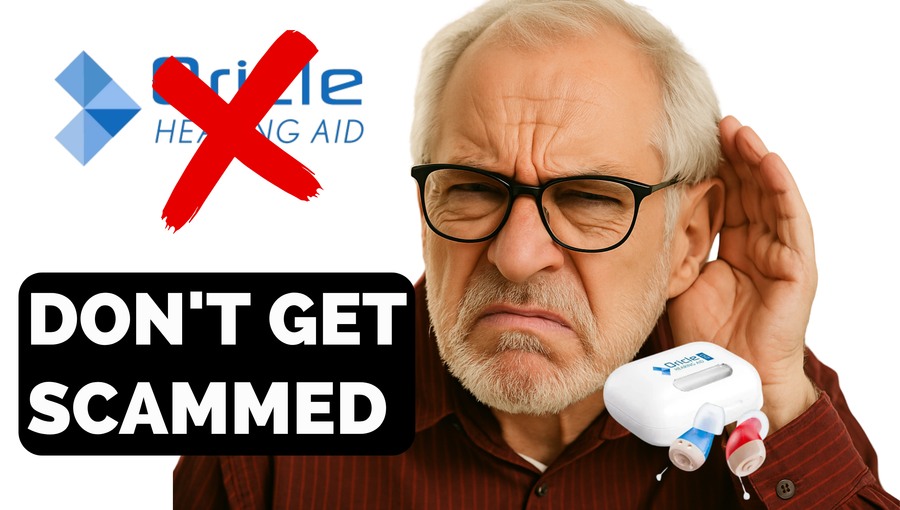

You’ve probably seen the ads. A slick-looking hearing aid, “smallest ever,” “doctor-designed,” “trusted by over 350,000 customers.”
But when our editors started looking into this fast-growing brand, what we found was disturbing.
At first glance, Oricle Hearing appears to offer a budget-friendly solution for people struggling with hearing loss. But dig a little deeper, and the red flags start to pile up: fake reviews, shady return policies, misleading specs, and what looks like a deliberately confusing product page.
In this report, we’ll break down exactly why Oricle’s marketing is raising so many eyebrows, and why more and more people are sounding the alarm.
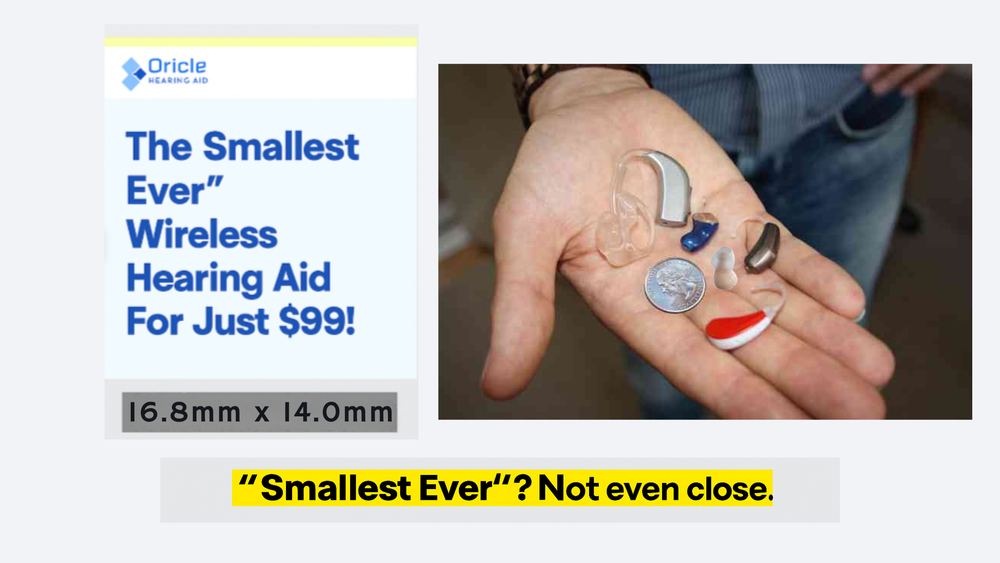
Oricle claims to sell the “smallest ever” hearing aid, but when we actually got our hands on the product, that statement didn’t hold up.
First, there’s no official size listed on their main website. That’s suspicious by itself. But digging deeper, we found an Amazon listing that describes the Oricle hearing aid as “nearly invisible” at 16.8mm x 14.0mm. That may sound small… Until you see it in someone’s ear.
The device is noticeably bulky when worn and sits visibly in the ear canal. The bright white color makes it even more noticeable, especially for older adults with lighter skin tones. In side-by-side comparisons, it clearly stands out: Nothing about it looks "invisible."
Worse, their ad images often use shadows, angles, or cropped photos to make the product appear smaller than it really is. That kind of manipulation is misleading at best, and deceptive at worst.
If you're shopping for a discreet hearing solution, size matters. And Oricle’s “smallest ever” claim seems more like a sales gimmick than a statement of fact.
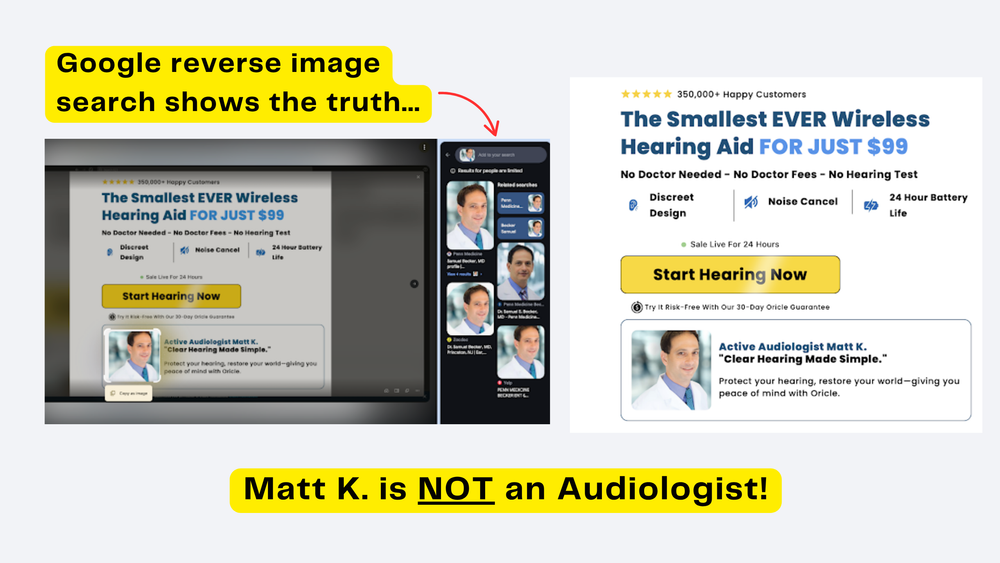
One of the boldest claims on Oricle’s website is that their hearing aids are “doctor-designed” and “recommended by audiologists.”
At first glance, that sounds reassuring. But when we tried to verify those claims, we ran into a wall of smoke and mirrors.
Previously, the Oricle site featured an “Active Audiologist Matt K.” endorsing their product. But a quick reverse image search revealed that the photo they used wasn’t an audiologist at all, it was a stock image of a completely unrelated doctor from New Jersey. That image, and the “Matt K.” reference, have since quietly disappeared from the site.
Today, Oricle still claims their hearing aids are “doctor-designed,” but nowhere do they name a single medical professional involved in the development or endorsement of the product. No audiologist bios. No medical advisors. Nothing.
This kind of vague, unverifiable medical endorsement is a huge red flag. Legitimate health-related companies are proud to share their clinical partnerships and expert contributors. The fact that Oricle leans on generic “doctor recommended” language without providing any real names or credentials is deeply concerning.
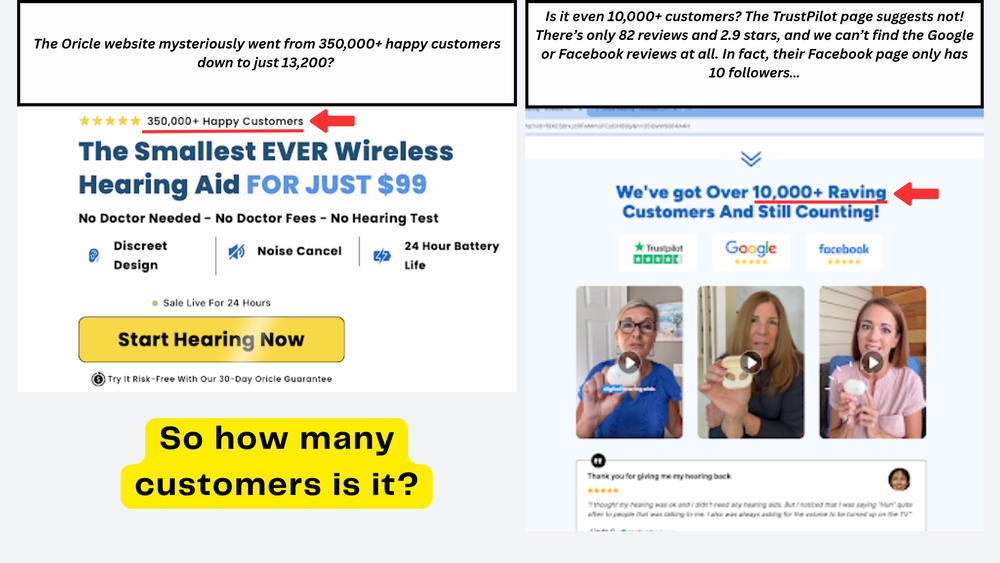
One of Oricle’s biggest marketing points is the supposed number of people who love their product.
On one version of their website, they claimed to have over 350,000 happy customers. But a few weeks later, the same site listed 13,200+ five-star reviews. More recently, that number has dropped again, showing just over 10,000 satisfied customers.
So which is it?
We dug further and checked third-party review platforms. Their Trustpilot page only had 82 reviews (with an average rating of 2.9 stars), and we couldn’t find any reviews listed on Google or Facebook, even though their site shows badges for both.
Even stranger, their Facebook page has only 10 followers, which is unusually low for a brand claiming hundreds of thousands of sales.
This inconsistency is suspicious. Why would a brand with hundreds of thousands of customers have almost no trace of them online, except for a few negative reviews on Amazon?
The answer is simple: they likely don’t. These inflated numbers are more marketing fiction than consumer fact.
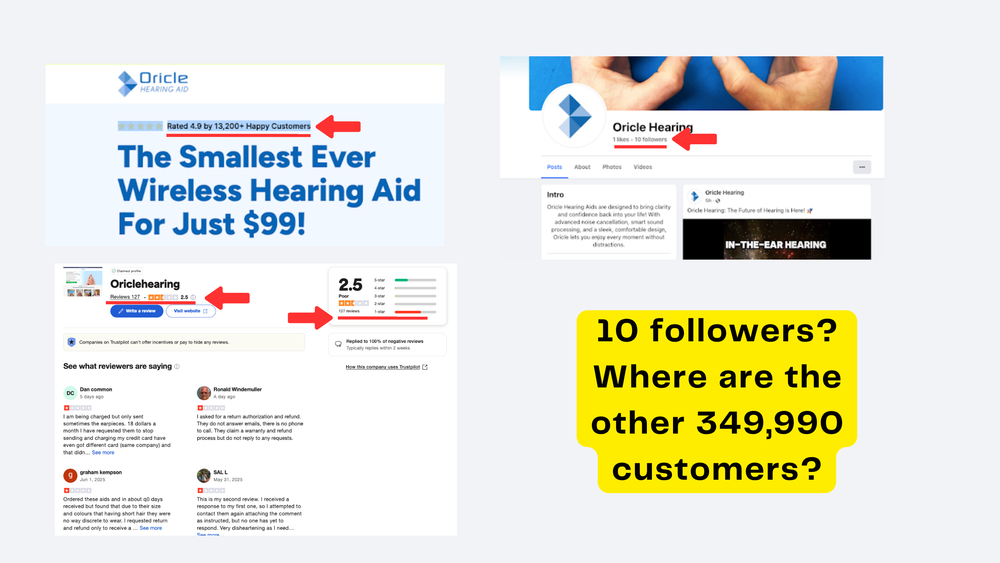
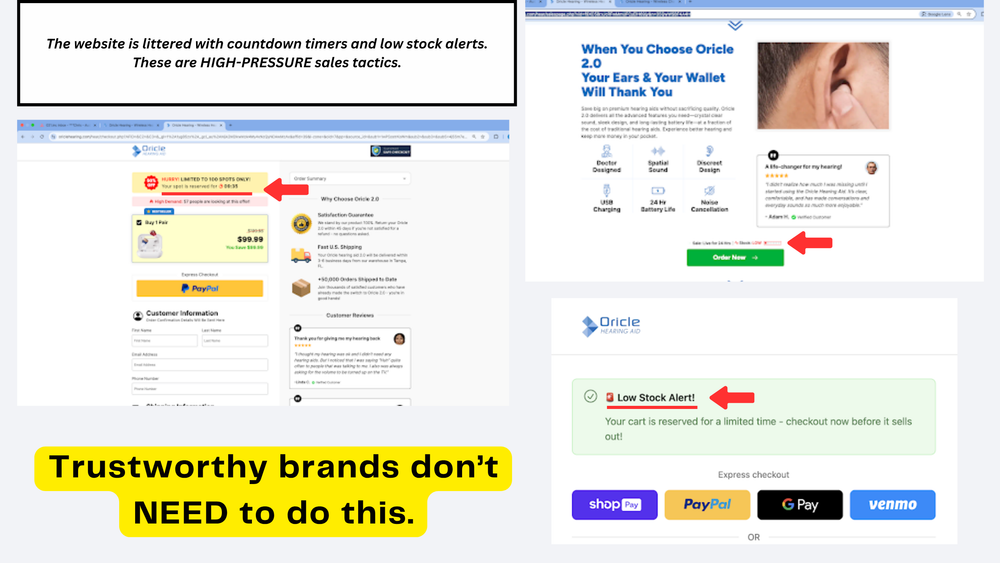
If you’ve ever been to Oricle’s website, you’ve probably seen urgent messages like:
“Only 4 units left in stock!”
“24-Hour Sale – Ends Tonight!”
“LOW INVENTORY – Buy Now Before It’s Gone!”
Here’s the truth: none of those things appear to be real.
Our team refreshed the page across multiple days and devices, and every time, the same countdown timer restarted. The “stock alert” always stayed low. The sale was always ending “soon.”
Using fake urgency to pressure customers into a purchase isn’t just dishonest, it’s potentially illegal under consumer protection laws.
And then there’s the issue of press coverage. Oricle claims to have been featured in Fox, CBS, Forbes, GQ, and more. But when we searched each of those platforms, we couldn’t find a single article or mention. No interviews. No coverage. Nothing.
If a company is being featured in top-tier outlets, that coverage should be easy to verify. In Oricle’s case? It's just another example of claims that collapse under scrutiny.
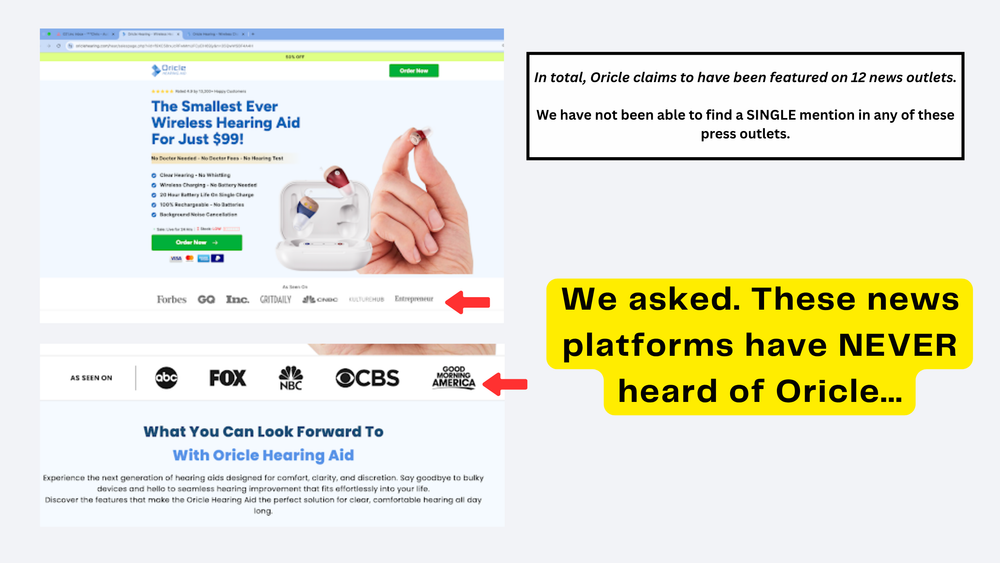
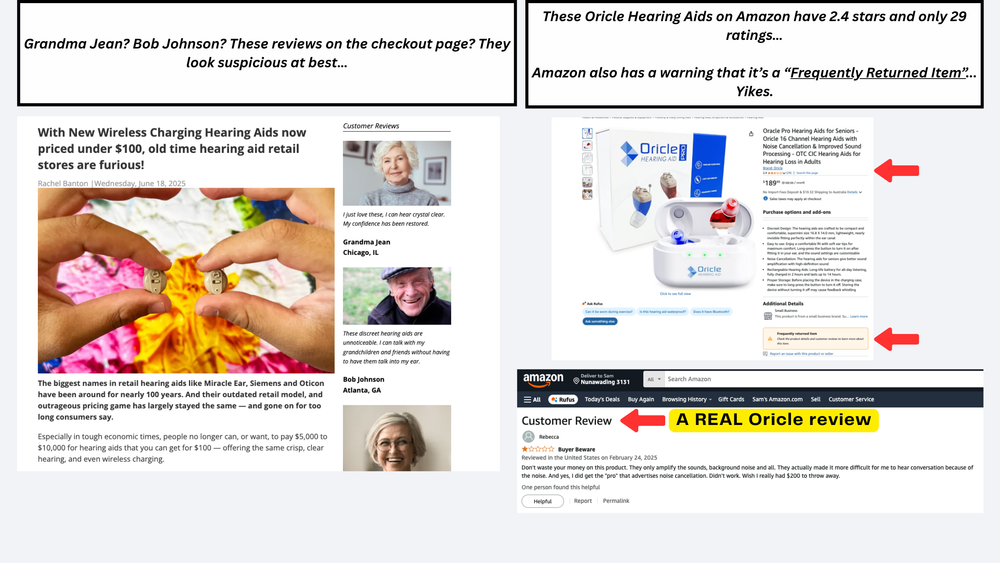
Scroll through Oricle’s checkout page and you’ll see glowing five-star reviews from people like “Grandma Jean” and “Bob Johnson.” They’re vague. They’re overly enthusiastic. And many of them sound eerily similar—like they were written by the same person.
Meanwhile, over on Amazon, the reality is very different.
The Oricle 2.0 has just 29 ratings, and the average is barely 2.4 stars. Verified customers call it “cheap,” “unreliable,” and “not what was advertised.” Many mention issues with sound quality, poor volume control, and no noticeable improvement in hearing clarity.
But that’s not the only misleading element.
Oricle’s website claims their devices come with advanced feedback cancellation and multiple sound programs. Yet we found a customer service chat transcript where a company rep flat-out admits:
“Our product does not include enhanced feedback cancellation.”
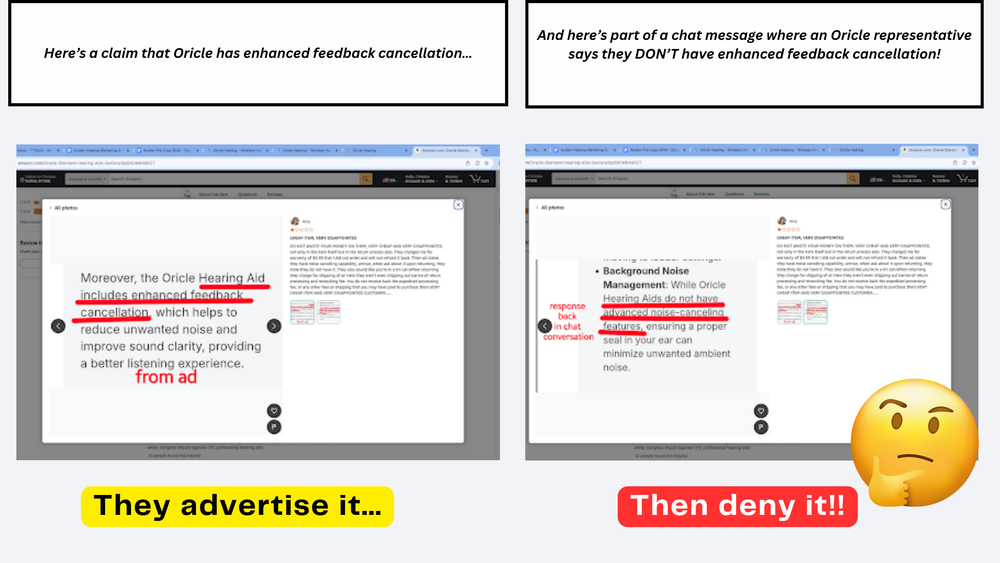
Even more concerning: Oricle says their device has 2 hearing modes, but it also uses an analog chip, and those features are typically only possible with digital components.
So what does that mean?
It strongly suggests that this isn’t a real hearing aid at all. It’s likely a basic sound amplifier with limited tech, being sold at a markup using misleading specs.
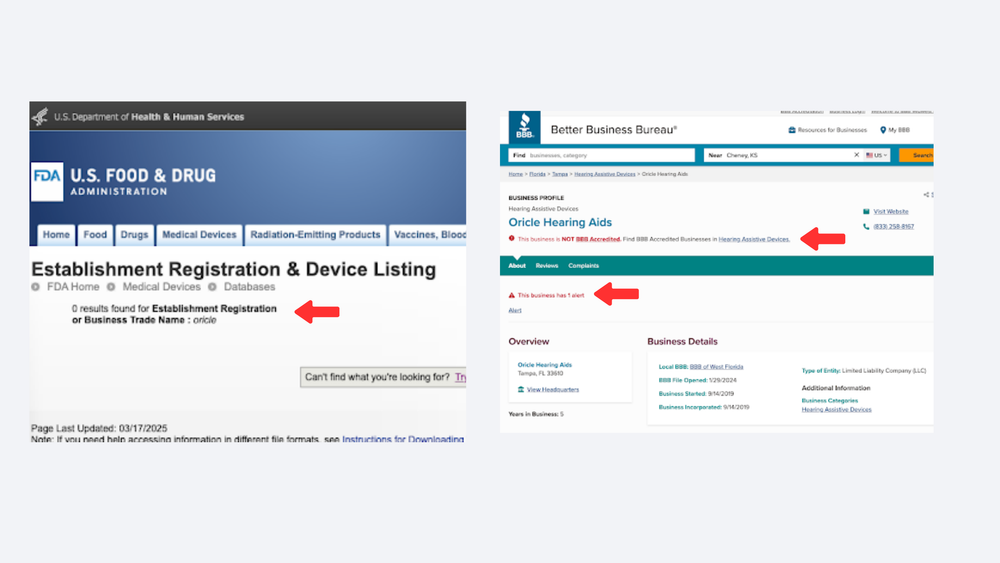
In the U.S., real hearing aids are classified as medical devices, and that means they should be registered with the FDA. But when we searched the FDA’s device database, Oricle was nowhere to be found.
That’s a major red flag. Any company making legitimate hearing aids should be operating under FDA oversight.
But it doesn’t stop there.
Oricle is also not accredited by the Better Business Bureau, and there are multiple complaints filed about misleading returns, unclear policies, and products not working as promised.
A few of the reviews we found mention customers being charged restocking fees, denied refunds, and told that warranties were automatically added without their consent.
We also found a buried section of Oricle’s return policy stating that shipping, processing fees, and restocking costs are non-refundable - a fact that isn’t made clear anywhere in the main checkout process.
All in all, these business practices raise serious concerns. A trustworthy brand doesn't need to hide behind vague terms, fake reviews, or sketchy policies.
At this point, the signs are hard to ignore. The combination of fake endorsements, fake urgency, fake reviews, and questionable tech specs paint a clear picture: Oricle doesn’t seem to be selling what they claim to be.
And unfortunately, this isn’t the first time a company has tried to take advantage of older adults looking for affordable health solutions online.
Here are a few red flags to look out for when shopping for any hearing aid online:
If you’ve already purchased from Oricle, you may want to reach out to your credit card company, check your charges, and read their return policy closely. And if you’re still shopping, consider this a warning: not all “hearing aids” are created equal.
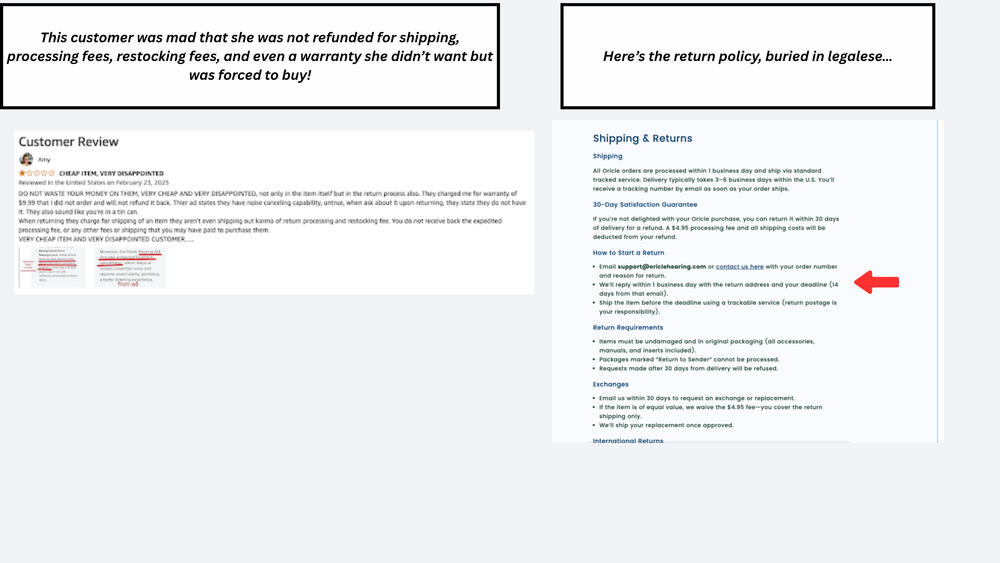
Luckily, we’ve found a hearing aid that’s at a similar price point to Oricle, but it’s a legitimate hearing aid…
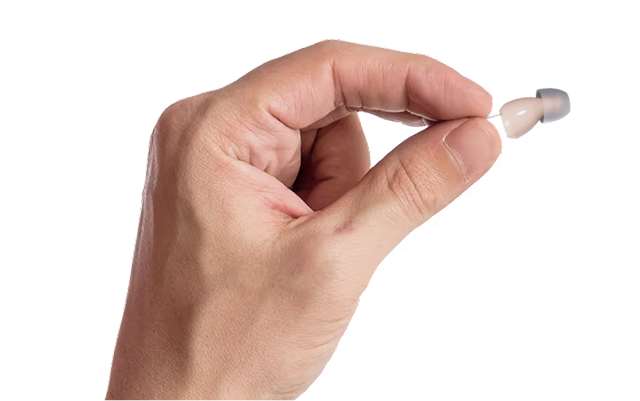
If you're looking for a hearing aid in the same price range as Oricle, we strongly suggest doing your homework, and looking into brands that are transparent about how their devices work, who’s behind them, and what kind of feedback they’ve actually received.
One of the brands that stood out during our research was Audien Hearing.
Unlike many companies in this space, Audien is:
And has hundreds of verified customer reviews available on third-party platforms like TrustPilot (currently rated 4.2 stars)
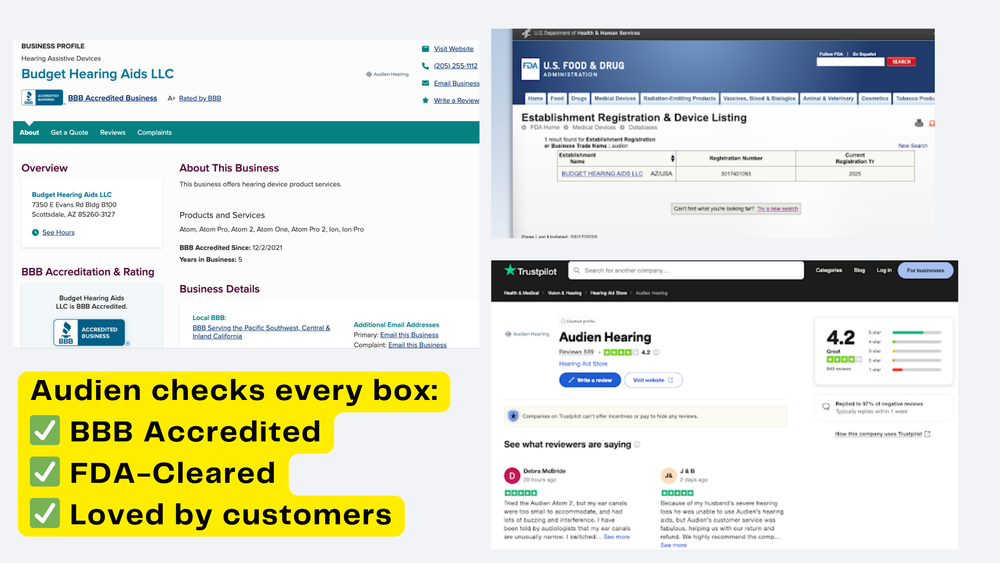
If you're looking for a hearing aid in the same price range as Oricle, we strongly suggest doing your homework, and looking into brands that are transparent about how their devices work, who’s behind them, and what kind of feedback they’ve actually received.
One of the brands that stood out during our research was Audien Hearing.
Unlike many companies in this space, Audien is:
And has hundreds of verified customer reviews available on third-party platforms like TrustPilot (currently rated 4.2 stars)
Their devices fall within a similar price range - starting around $189 - and include some amazing key features that are typically found in much higher-end models:
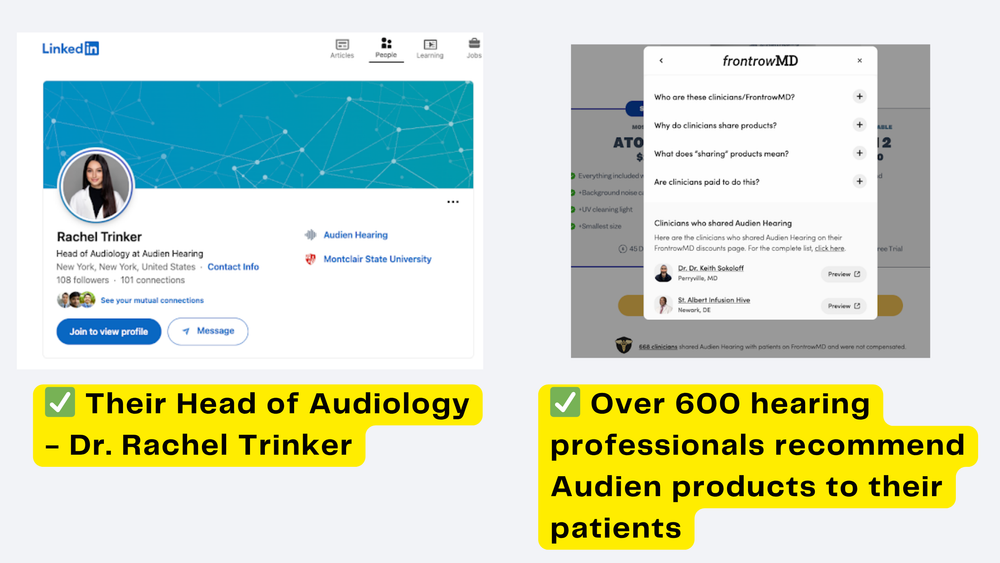
Audien also publicly names its lead audiologist (Dr. Rachel Trinker) and discloses that over 600+ hearing professionals have shared their products with patients… without being paid to do so. That level of transparency is rare in this category.
While no over-the-counter hearing aid is perfect for everyone, Audien’s commitment to clear product specs, visible clinical support, and straightforward pricing makes it a brand worth considering - especially if you're trying to avoid the confusion and red flags we uncovered elsewhere.
So if you’re on the hunt for an affordable hearing aid that delivers quality results, we recommend checking out Audien Hearing. They avoid the red flags and pitfalls of questionable brands, and they’re backed by quality results.